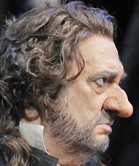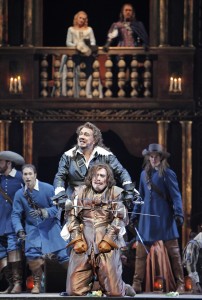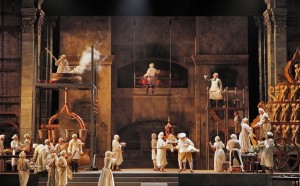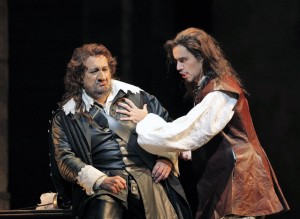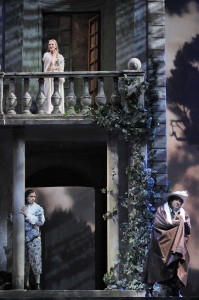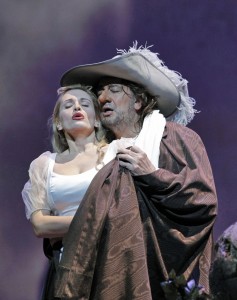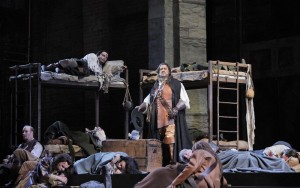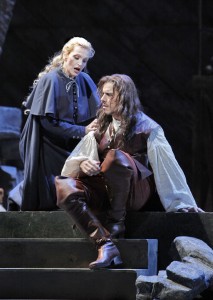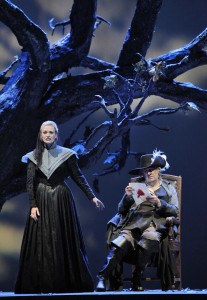Several years ago I took a guided tour of the harbor in Antwerp, Belgium.¬† As we passed each place of interest, the guide would give a short spiel in English and would repeat it three or four times in French, Italian, German, and maybe Flemish.¬† Speaking in English, he pointed out a statue with a large nose and compared it to Jimmy Durante.¬†¬† Then when he gave his spiel in Italian the comparison was to “Pinocchio,”¬†¬† and in German to “Till Eugenspiel;” in French he made a comparison to (you guessed it) Cyrano de Bergerac.
Walking into War Memorial Theater last night, my primary feeling was one of excitement: I was about to be in the same room as Plť°cido Domingo, and I was going to hear him sing – Live.¬† For the first and in all probability last time in my long life.¬† That experience was, of course, memorable.¬† Common sense says that at almost 70 his voice must have lost something, but you couldn’t prove it by me.¬† Unfortunately, I can’t say that any of the other voices fully met the challenge of singing with him.¬† And at times the orchestra sounded too loud.¬† There was nothing wrong with the music of Franco Alfano, but he’s not in the same league as Puccini and Verdi.¬† Over all, the production had lots of good features, but somehow they just didn’t all come together to create Opera at its best.
But enough nattering negativism.¬† I’d rather talk about the things I did like.¬† To start with, the start was unusual.¬† There is a universality about the start of every other opera that I have seen live.¬† The house lights dim, the audience grows quiet, the concert master signals for the pitch tone, the musicians fine-tune their instruments.¬† There is silence and darkness.¬† The¬† Conductor is spot-lighted as he or she comes to the podium, receives applause, bows, turns to face the orchestra.¬† The house becomes still as the Maestro’s arms are raised then lowered to begin the overture, and each opera proceeds in its own way.
When we first sat down, there were a few props on stage in front of the curtain, most notably a large candled chandelier resting on the stage.¬† As the starting time of 7:30 approached, a couple of stage-hands wandered on stage with another prop or to adjust one already there.¬† The house lights were still on and the audience was still talking when several actors came on stage, the chandelier began to rise to its proper overhead location, the house lights began to dim, and the audience gradually realized that it was time to shut up and pay attention.¬† It is obvious that we are seeing the stage of a theater and that a rich but untalented company is about to start a play.¬† There is a great deal of prancing about and exaggerated gesturing.¬† Dramatic entrances are made, including the “star” Montfleury (Martin Rojas-Dietrich) on the back of a flying dragon.
At some point while all this is going on, the Conductor (Patrick Fournillier) must have sneaked up to the podium because the orchestra starts playing the overture.¬† Shortly thereafter Cyrano de Bergerac (Plť°cido Domingo) enters through the “audience” and leaps up on the stage.¬† He stops the performance, and humiliates Montfleury by yanking off his preposterous red wig and literally chasing him off the stage.
This act infuriates Vicomte de Valvert (Austin Kness) who unwisely challenges Cyrano to a duel.  Without inflicting even a scratch on the Vicomte, Cyrano disarms him and forces him into an embarrassing and totally vulnerable position, all the while composing and reciting a disrespectful ballad about him.
Cyrano’s motivation for all these goings-on is his deep and abiding love for his beautiful cousin Roxane (Ainhoa Arteta) with whom he had grown up.¬† However, as he confesses to his friend Le Bret (Timothy Mix) he knows that his big nose makes him so ugly that Roxanne couldn’t possibly love him in return so he dares not declare his love.¬† However, he gains hope at the end of Act I when Roxane’s Duenna (Maya Lahyani)¬† brings him a message that her mistress would like to see him privately the next day.
Indeed, love for Roxane is the driving force behind the entire¬† play by Edmond Rostand, and it is faithfully carried over to Franco Alfano’s opera by librettist Henri Cain.¬† Not only the true unselfish love of Cyrano, but the lustful loves of de Valvert and the powerful nobleman De Guiche (Stephen Powell) and the romantic love of the new cadet Christian de Neuveville (Thiago Arancam).
Act II opens in the bakery of Cyrano’s friend Ragueneau (Brian Mulligan).¬† Although the opening scene does nothing to forward the plot, it does present us with another fantastic set and lets the magnificent men’s chorus appear on stage in costumes quite different from those of play-goers and theater audience that they wore in the previous act.
However, when Roxane’s Duenna appears with news that her mistress is approaching, Cyrano shoos everyone else out, hoping against hope that Roxane will declare her love for him.¬† Instead, he has to hide his disappointment when Roxane declares her love for the handsome new cadet, Christian, and asks Cyrano to take the boy under his wing and make sure that he doesn’t get killed in a silly duel.
The two men then have their own tť™te-ť†-tť™te.¬† Christian tries to prove his bravery by goading Cyrano into a duel, not realizing that he is only proving his stupidity.¬† Cyrano, of course, will have none of it and suggests they be friends instead.¬† “You seem to have a problem, kid.¬† Tell me about it.”¬† “Yeah.¬† Well it’s like I’m in love with this girl but every time I try to you know write to her or talk to her the words, like they just dry up and I like you know just look you know foolish.”¬†¬† [Those are not the exact words in the supertitles, and what little French I once knew has long since deserted me; but I’ve got a teenage grandson and I know whereof I speak.]¬† After a bit of palavering Cyrano says, “OK, we’ve got a deal.¬† I write – you sing.¬† With your looks and my words we’ll make a lover Roxane can’t resist.”
Digression: At¬† an English garden party many years ago a gushing young Society matron approached George Bernard Shaw with, “Oh, Mr. Shaw.¬† I want to have your baby.¬† Just think, with my beauty and your brains our child will be a phenomenon.”¬† Replied Shaw, “But madam, suppose the child has my beauty and your brains?” .¬† .¬† .¬† .
In a scene reminiscent of Don Giovanni, the two men conceal themselves beneath Roxane’s balcony, Christian summons her and then sings her line by line as Cyrano composes them.¬† Cyrano grows impatient with Christian’s fumbling his lines, so “he begins to imitate Christian’s voice” (honest, that’s what the program synopsis says, but it still sounded like Domingo to me) and directly sing his heart-felt words.
Roxane is no Priscilla Mullins and is completely taken in by the deception.  She descends from her balcony and closes her eyes in rapture.  Cyrano takes advantage of this to get real close and personal, then dexterously fades away motioning Christian to take his place.
Silly, but a nice note to end Act II and enjoy the single intermission.¬† [Our enjoyment was enhanced when immediately after the house lights went on the supertitle screen flashed the words, “Giants 11¬† Rangers 7”]
Act III takes place at the Gascon camp at Arras.¬† Christian has a premonition of death and asks Cyrano to write a final love letter to Roxane.¬† “Already written,” says Cyrano and hands him the letter.¬† Suddenly there is excitement and Roxane shows up!¬† Asked how she was able to get through the Spanish lines, she replies that the Spaniards are hopelessly romantic.¬† “I told them I was going to see my lover, and they just waved me on.¬† If I had said Ďhusband’, they would have shot me.”¬† She has brought food for which the soldiers are truly grateful.
Digression: When I was at the University of Minnesota 30 some years ago, the second highest administrator – the Chancellor – was a woman.¬† Highly unusual in the 1970’s.¬† When asked how she could function is a world populated almost entirely by men, she replied, “I am ruthlessly charming.”¬† .¬† .¬† .¬† .
She is left alone with Christian, and she tells him how much she loves him.¬† At first it was just his handsome body, but now it is his soul, as revealed by the sublime words he has written to her.¬† This comes as a shock to Christian, but he wants to nail it down.¬† “Would you love me even if I were ugly?”¬† “Yes, yes, yes.¬† What does it matter what the face looks like when the soul is so beautiful?”
Christian may not be bright, but is truly noble at heart.¬† Rather than accepting Roxane’s love under false pretenses, he sends her off to cheer up the troops and tells Cyrano the truth: “It’s you she loves, not me.¬† You’ve got to tell her.”¬† He then goes off to battle and shortly thereafter his lifeless body is carried in on a stretcher.¬† Roxane throws herself on it in grief, sees the final letter, and declares that she will be ever-faithful to his memory.¬† The curtain ends Act III.¬† Cyrano hasn’t said a word.
Fifteen years have passed before the final act.  Roxane has retired to a convent, and Cyrano visits her there every week.  He is a few minutes late this week because he was attacked by assassins.  He and we know that he has suffered a fatal wound Рthis will be his final visit.
He asks to see Christian’s final letter, and sits to read it.¬† She stands gazing off into the distance.¬† He starts reading from the letter, but his arm soon drops and he continues “reading” as the letter sits unnoticed in his lap.¬† She hasn’t moved, but when he comes to the end she starts to turn, saying, “It’s gotten dark.¬† How could you see .¬† .¬† .¬† .¬† (she sees the forgotten sheet of paper in his lap) .¬† .¬† .¬† .¬† that voice¬† .¬† .¬† .¬† .¬† that was you¬† .¬† .¬† .¬† .¬† you wrote those letters¬† .¬† .¬† .¬† .¬† It is you that I have loved all these years.¬† .¬† .¬† .¬† .¬† Don’t die, Cyrano .¬† .¬† .¬† .¬† .¬† You must live .¬† .¬† .¬† .”
But it is too late.¬† He stands and seemingly addresses the empty air: “But since Death comes, I meet him still afoot with sword in hand.¬† I know that you will lay me low at last; let be.¬† Yet I fall fighting, fighting still.¬† You strip from me the laurel and the rose!¬† One thing is left, that, void of stain or smutch I bear away despite you – MY PANACHE.”
— quoted from Cyrano’s final speech in the play Cyrano de Bergerac by Edmond Rostand, translated by Gladys Thomas and Mary F. Guillermard
The Opera Nut
| CYRANO | |||
| Franco Alfano | |||
| October 30 ‚-Ź (8:00 p.m.) ; | |||
| November 2 ‚-Ź (8:00 p.m.) | |||
| November 6 ‚-Ź (2:00 p.m.) | |||
| November 9 ‚-Ź (7:30 p.m.) | |||
| November 12 ‚-Ź (8:00 p.m.) | |||
| San Francisco Opera Premiere | |||
| Libretto by Henri Cain | |||
| After Edmond Rostand’s Cyrano de Bergerac | |||
| Approximate running time: 3 hours, including one intermission and 3 pauses | |||
| Sung in French with English supertitles | |||
| San Francisco Opera | |||
| 301 Van Ness Avenue | |||
| San Francisco, CA 94102 | |||
| (415) 861-4008 | |||
| sfopera.com | |||
| Except as noted, all photos by Cory Weaver San Francisco Opera | |||
| Cast: | |||
| Cyrano de Bergerac | Plť°cido Domingo | ||
| Roxane | Ainhoa Arteta | ||
| Christian de Neuveville | Thiago Arancam | ||
| De Guiche | Stephen Powell | ||
| Ragueneau | Brian Mulligan | ||
| Le Bret | Timothy Mix | ||
| Carbon | Lester Lynch | ||
| Vicomte de Valvert, The Spanish Official, A Cook | Austin Kness | ||
| The Duenna, Sister Marta | Maya Lahyani | ||
| Lisa, A Lay Sister | Leah Crocetto | ||
| Montfleury | Martin Rojas-Dietrich | ||
| Sentinels | David Gustafson | ||
| Sentinels | Christopher Jackson | ||
| LigniŤre, A Musketeer | Bojan Knezevic | ||
| Production Team: | |||
| Conductor | Patrick Fournillier | ||
| Director | Petrika Ionesco | ||
| Set Designer | Petrika Ionesco | ||
| Costume Designer | Lili Kendaka | ||
| Lighting Designer | Petrika Ionesco | ||
| Fencing Choreographer | Franťßois Rostain | ||
| Chorus Director | Ian Robertson | ||
This review by Philip G Hodge appeared in sanfranciscosplash.com on October 29, 2010.

